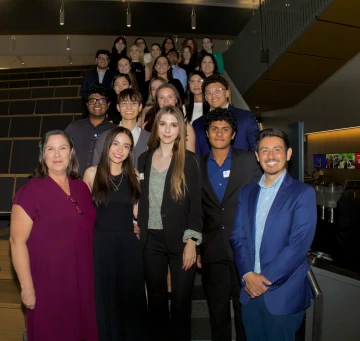STEP-UP program expands efforts to train future cancer prevention workforce

As cancer rates continue to rise and prevention remains a critical public health priority, the University of Arizona Comprehensive Cancer Center is once again investing in the future of cancer research and care through the Student Transformative Research Experience to Progress Undergraduate/Graduate Professionals, also known as the STEP-UP program.
Led by cancer center members Jennifer W. Bea, PhD and David Garcia, PhD, STEP-UP offers upper-level undergraduate and master’s-level students a 10-week summer research experience focused on cancer prevention and control. The program, supported by a grant from the National Cancer Institute, was adapted from an earlier version that ran from 2017 to 2023 under Bea and Cynthia A. Thomson, PhD, RDN.
Since the start of the program, and over the course of seven cohort groups, STEP-UP has trained 128 students, including three alumni who returned this summer as near-peer mentors to the new cohort.

This year’s participants came from nine institutions nationwide, including the University of Arizona. Each student was matched with one of nearly 40 faculty mentors based on research interests and received hands-on training in laboratories, clinical settings and community-based projects. In addition to their research, students engaged in six to eight hours of career development activities each week.
The program culminated in two major presentations: students shared their summer research projects on Aug. 8 in the Health Sciences Innovation Building atrium and presented their Southern Arizona Sun Safety community outreach work on Aug. 13.
In July, STEP-UP received its annual notice of award from the NCI, securing funding through 2026.
“We’re incredibly proud of what our students and mentors have accomplished,” Bea said. “Thanks to the support of cancer center investigators, we are building a capable cancer prevention workforce that’s well equipped to tackle today’s public health challenges.”
This project is supported by the National Cancer Institute, award number R25CA275753 and the University of Arizona (AHSC, UACCC, and MEZCOPH).



